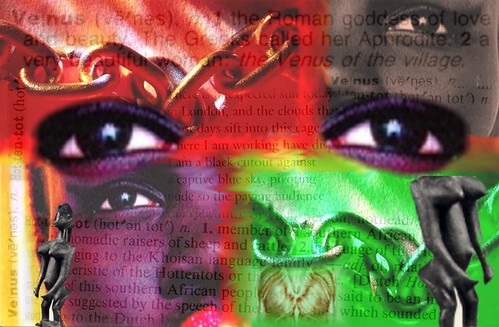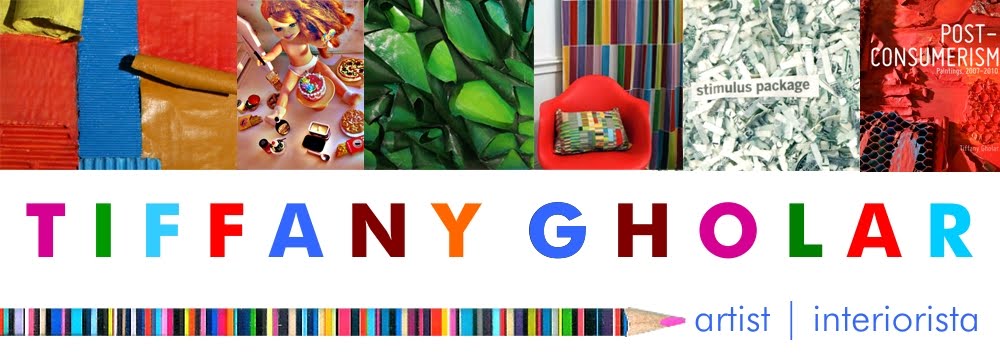
"Venus Hottentot Montage" Digital Montage 11"x14" 1997
Since February is Black History Month, I will be featuring pieces from my archives that relate to that theme.
The subject of my first piece is not an African-American. Saartjie Baartman was originally from South Africa, but came to Europe as part of a traveling sideshow where she was billed as The Venus Hottentot. I read a poem about her for a humanities class my freshman year of college. It was the first time I'd ever heard her story. For our final project, we were given the option of writing a paper or creating a piece of artwork that illustrated the themes of the texts we had read for the class. Of course, I chose the artistic option. But I still had to write something to go with it. So you can read what I wrote about it below. And also, I have included the poem that this picture illustrates.
I found Elizabeth Alexander’s poem “The Venus Hottentot” interesting because, as we began studying the idea of what an object is and how it can be displayed, “The Venus Hottentot” explores the concept of a person being treated as an object. It portrays the young woman both as a curio who is destined to become a collector’s specimen and as a woman whose hopes have been unfulfilled. In my montage, I use images that show the young woman as an object and as a person. The chains symbolize her confinement, while the close-ups of her face are there to show her humanity. The African statues represent the woman’s naked body, which was put on display. I also included a small clipping of a medical illustration to foreshadow her ultimate fate. The text included in the picture is taken from the poem as well as from dictionaries. I felt it was necessary to use definitions of both “Venus” and “Hottentot” so viewers can examine more closely the meaning of the poem. I am also trying to illustrate the idea that the African woman is more than just something that should be defined and displayed, that she is a person. This is why the eyes stare out of the picture longingly. I think that this montage conveys my interpretation of the poem.
Copyright © Elizabeth Alexander, from The Venus Hottentot, Graywolf Press, 2004
The Venus Hottentot
(1825)
1. Cuvier
Science, science, science!
Everything is beautiful
blown up beneath my glass.
Colors dazzle insect wings.
A drop of water swirls
like marble. Ordinary
crumbs become stalactites
set in perfect angles
of geometry I’d thought
impossible. Few will
ever see what I see
through this microscope..
Cranial measurements
crowd my notebook pages,
and I am moving close,
close to how these numbers
signify aspects of
national character.
Her genitalia
will float inside a labeled
pickling jar in the Musee
de l’Homme on a shelf
above Broca’s brain:
“The Venus Hottentot.”
Elegant facts await me.
Small things in this world are mine.
2.
There is unexpected sun today
in London, and the clouds that
most days sift into this cage
where I am working have dispersed.
I am a black cutout against
a captive blue sky, pivoting
nude so the paying audience
can view my naked buttocks.
I am called “Venus Hottentot.”
I left Capetown with a promise
of revenue: half the profits
and my passage home: a boon!
Master’s brother proposed the trip;
the magistrate granted me leave.
I would return to my family
a duchess, with watered-silk
dresses and money to grow food,
rouge and powder in glass pots,
silver scissors, a lorgnette,
voile and tulle instead of flax,
cerulean blue instead
of indigo. My bother would
devour sugar-studded nonpareils,
pale taffy, damask plums.
That was years ago. London’s
circuses are florid and filthy,
swarming with cabbage-smelling
citizens who stare and query,
“Is it muscle? Bone? Or fat?”
My neighbor to the left is
The Sapient Pig, “The Only
Scholar of His Race.” He plays
at cards, tells time and fortunes
by scraping his hooves. Behind
me is Prince Kar-mi, who arches
like a rubber tree and stares back
at the crowd from under the crook
of his knee. A professional
animal trainer shouts my cues.
There are singing mice here.
“The Ball of Duchess DuBarry”:
In the engraving I lurch
towards the belles dames, mad-eyed, and
they swoon. Men in capes and pince-nez
shield them. Tassels dance at my hips.
In this newspaper lithograph
my buttocks are shown swollen
and luminous as a planet.
Monsieur Cuvier investigates
between my legs, poking, prodding,
sure of his hypothesis.
I half expect him to pull silk
scarves from inside me, paper poppies,
then a rabbit! He complains
at my scent and does not think
I comprehend, but I speak
English. I speak Dutch. I speak
a little French as well, and
languages Monsieur Cuvier
will never know have names.
Now I am bitter and now
I am sick. I eat brown bread,
drink rancid brother. I miss good sun,
miss Mother’s sadza. My stomach
is frequently queasy from mutton
chops, pale potatoes, blood sausage.
I was certain that this would be
better than farm life. I am
the family entrepreneur!
But there are hours in every day
to conjure my imaginary
daughters, in banana skirts
and ostrich-feather fans.
Since my own genitals are public
I have made other parts private.
In my silence, I possess
mouth, larynx, brain, in a single
gesture. I rub my hair
with lanolin, and pose in profile
like a painted Nubian
archer, imagining gold leaf
woven through my hair, and diamonds.
Observe the wordless Odalisque.
I have not forgotten my Xhosa
clicks. My flexible tongue
and healthy mouth bewilder
this man with his rotting teeth.
If he were to let me rise up
from this table, I’d spirit
his knives and cut out his black heart,
seal it with science fluid inside
a bell jar, place it on a low
shelf in a white man’s museum
so the whole world could see
it was shriveled and hard,
geometric, deformed, unnatural.


No comments:
Post a Comment